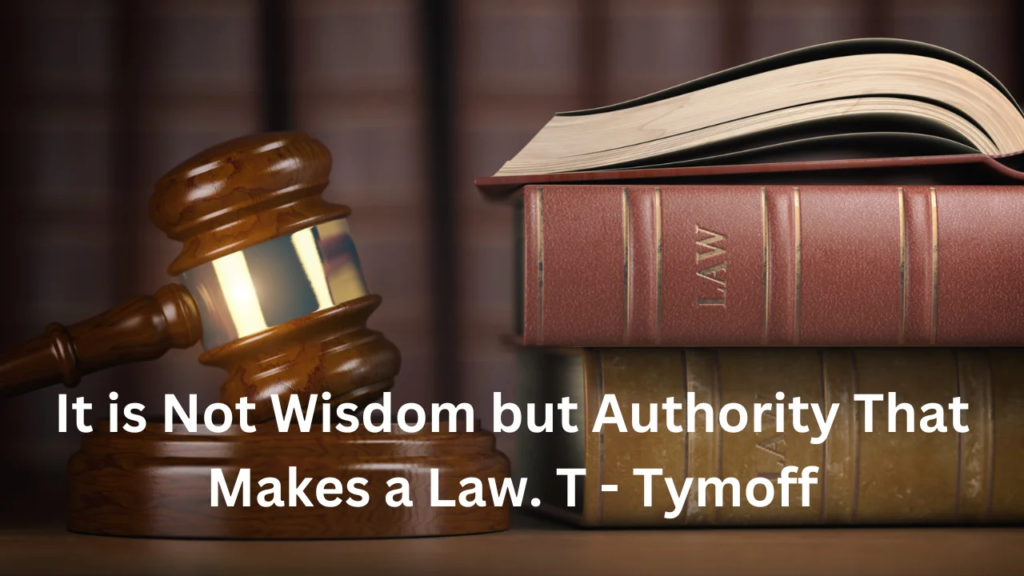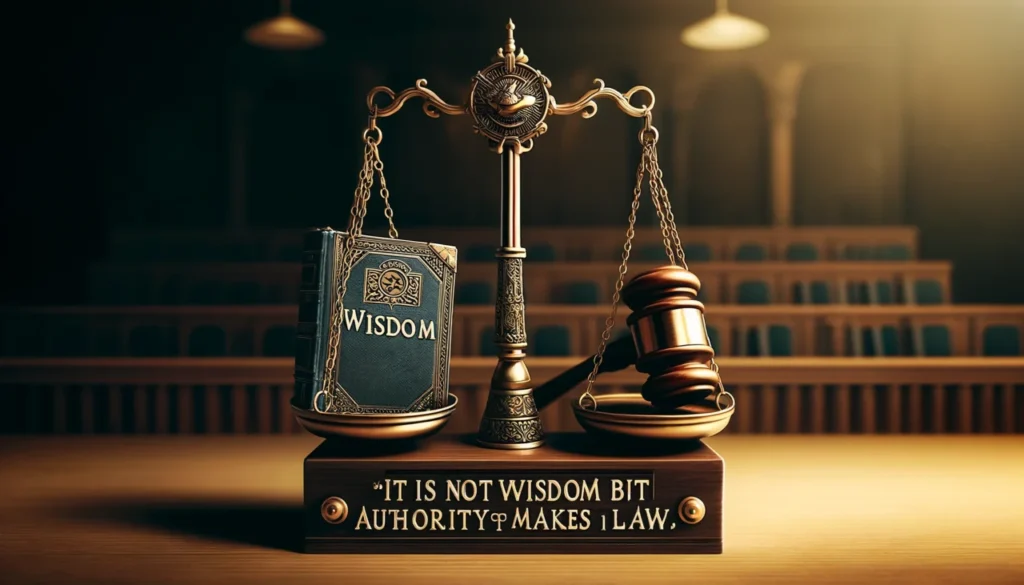The phrase “It is not wisdom but authority that makes a law” attributed to Edward Gibbon, not T. Tymoff, offers a provocative perspective on the foundational principles of legal governance. This assertion challenges the idealistic view that wisdom alone shapes our legal systems, emphasizing instead the pivotal role of authority. This article explores the intricate dynamics between wisdom and authority in lawmaking, examining historical examples, theoretical insights, and contemporary debates.
Why Laws are Made: The Primacy of Authority
Laws are primarily tools for maintaining order and regulating societal behavior. While the ideal of wisdom-infused legislation is appealing, the reality is that authority—whether derived from political power, social hierarchies, or institutional mandates—is the cornerstone of law enforcement and creation. Authority ensures compliance and sets the boundaries within which society operates. Without the backing of recognized authority, even the wisest laws fail to achieve their intended effect.
The Role of Wisdom in Law
Although authority enacts laws, wisdom should ideally guide the creation and interpretation of these laws. Wisdom in lawmaking refers to the application of ethical reasoning, long-term societal benefits, and the lessons of history to craft regulations that not only command obedience but also promote the common good. However, the influence of wisdom is often overshadowed by the immediate demands of political agendas and power plays.
How Authority Manifests in Lawmaking
Authority in lawmaking manifests through various forms, including legislative bodies, executive actions, and judicial decisions. Each of these branches of government wields authority granted by constitutions, legal precedents, and public mandates. This authority is not merely the power to enforce obedience but also the recognized legitimacy to define right from wrong within a legal framework.
Objections to the Authority-Centric View
Critics of the authority-centric view argue that it leads to authoritarianism when unchecked by wisdom and moral considerations. They contend that laws should be more than instruments of power; they should reflect ethical judgments and collective wisdom to foster justice and equality.
Case Studies: Legal Evolution through Authority and Wisdom
Historical and contemporary case studies illustrate the tension and interplay between authority and wisdom in lawmaking. For instance, the civil rights laws in the United States emerged from a combination of authoritative judicial rulings and a wise understanding of social justice needs. These laws exemplify how authority, when aligned with moral wisdom, can effect significant social change.

Politics and the Necessity of Authority
In the political arena, authority often trumps consensus, reflecting Machiavelli’s principle that “it is better to be feared than loved” if one cannot be both. Political leaders use their authority to implement policies that may lack widespread wisdom but are deemed necessary for governance or crisis management.
Historical Examples of Authority over Wisdom
Throughout history, numerous laws exemplify the precedence of authority over wisdom. For instance, the draconian laws of ancient Athens were authoritative in nature, designed more to maintain order than to dispense justice based on wisdom.
Introspection into Lawmaking Dynamics
A deeper introspection into lawmaking reveals that while authority can enforce laws, the longevity and effectiveness of laws depend significantly on their wisdom. Laws that are wise endure and are respected, while those that are merely authoritative without wisdom are often contested and even overthrown.
The Ideal Balance Between Wisdom and Authority
The ideal legal system balances authority with wisdom. Authority ensures compliance and the practical application of laws, while wisdom ensures that these laws are just, equitable, and in tune with the evolving moral and ethical standards of society.

FAQs About Lawmaking Dynamics
Q: Can a law exist without authority? A: Technically, no. A law without authority is ineffective as it lacks the means for enforcement and recognition.
Q: Should wisdom or authority be the driving force in lawmaking? A: Ideally, both should play significant roles. Authority ensures enforcement and order, while wisdom ensures justice and ethical governance.
Q: How can societies ensure their laws reflect both authority and wisdom? A: Through robust democratic processes, public deliberation, and checks and balances that prevent the misuse of authority and encourage the incorporation of wisdom.
Conclusion
The statement that authority, not wisdom, makes a law highlights an essential truth about the nature of legal systems. While authority is necessary to enact and enforce laws, the best laws are those crafted with wisdom—reflecting deep ethical considerations and a commitment to the betterment of society. The challenge for modern legal systems is to find the right balance between these two indispensable forces.


